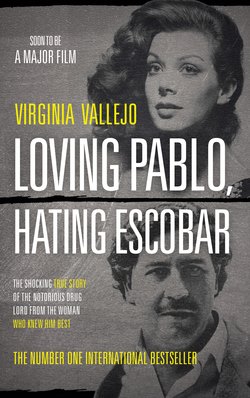Читать книгу Loving Pablo, Hating Escobar - Virginia Vallejo - Страница 16
На сайте Литреса книга снята с продажи.
ОглавлениеThe Lover of El Libertador
IT’S APRIL 28, 1983, and I receive a call from Pablo in my office. He announces that he’s going to give me some historically important news, but he asks me not to report on it or share it with anyone in the media; only with Margot, if I want to. In an excited tone that’s unusual in him, Escobar informs me that the plane of Jaime Bateman Cayón, head of the guerrilla movement M-19, has exploded over the Darién Gap while it was flying between Medellín and Panama City. I ask him how he knows, and he tells me that he’s in the loop about everything that goes on at the Medellín airport. But, he adds, Bateman’s death is the only part of the news that will be on all the international programs in a few hours. The part no one knows is that the rebel leader was carrying a suitcase with $600,000 in cash, and it hasn’t appeared anywhere. I’m disconcerted and I tell him so. How can anyone know, a few hours after a plane accident over one of the densest jungles on the planet, whether a suitcase turned up among the plane’s wreckage or alongside some incinerated bodies? From the other end of the line, Escobar laughs slyly and says that he knows perfectly well what he’s talking about, for the simple reason that one of his planes already found the wreckage of Bateman’s!
“Pablo, finding destroyed airplanes in the middle of the jungle takes weeks, if not months. Those pilots of yours are some real marvels, to be sure!”
“That’s right, my love. And since you are another marvel, I’ll leave you with that information so you can connect the dots! Say hi to Margot and Martita, and I’ll see you on Saturday.”
THE COLOMBIAN GOVERNMENT would take nine months to recover the bodies. On Bateman’s death it was learned that the M-19’s account in a Panamanian bank was under the name of the founder’s mother, Ernestina Cayón de Bateman, an important fighter in the cause of human rights. She and the group’s leaders would later get tangled up in a bitter conflict over a million dollars her son had deposited in Panama. Years later, an Ecuadorean banker designated as a go-between would end up with nearly all the money.
Pablo and I would never speak again about the mysterious suitcase. But I’d learned a valuable lesson from the only gravestone thief and auto mechanic with an aerial fleet I’ve ever met: helicopters and small planes belonging to controversial people who have many enemies rarely crash because of technical failures of divine origin; they almost always crash because of human intervention. Thus, the importance of tracking. About that $600,000—a figure from twenty-five years ago—today I can only cite that famous gringo saying: “If it walks like a duck, swims like a duck, and talks like a duck . . . it’s a duck!”
COUNTLESS SENATORS AND REPRESENTATIVES have been joining Santofimio’s movement, including many of my acquaintances from Bogotá, like María Elena de Crovo, one of ex-president López’s best friends; Ernesto Lucena Quevedo; Consuelo Salgar de Montejo, my father’s first cousin; and Jorge Durán Silva, “the People’s Mayor” and my fifth-floor neighbor. We spend many weekends out campaigning, and in every region we visit, liberal leaders and lopistas are added to our group of santofimistas.
One day, I hear loud laughter behind me, and I ask Lucena what’s so funny. Reluctantly, he tells me that Durán Silva has been mocking me in public, saying that Escobar sends his plane for me every time he wants to take me to bed. Unfazed and without turning around, I say at the top of my lungs so that everyone can hear:
“These guys today don’t know anything about women! I am the one who requests the biggest of the eleven airplanes every time I want to sleep with their owner!”
A tomb-like silence follows. After a brief pause, I add, “How naive, poor guys!” and I withdraw.
What my neighbor is ignoring is that all men in love listen to the woman who sleeps with them more than to anyone else. And Escobar is no exception. Pablo and I are well aware that because of the nature of the business feeding Santofimio’s campaign and my fame, we are exposed to all kinds of mockery and criticism, so we protect ourselves fiercely. Since he has an empire to manage and can’t be present for all the rallies and political meetings, we almost always see each other afterward or the following day, when I give him a detailed report on everything that’s happened. When I tell him about the People’s Mayor, he reacts like a lion.
“And why else would I send a jet that uses thousands of dollars in fuel for the woman I adore, who lives in another city? Am I going to take catechism lessons from a beauty like you? Are you Saint Maria Goretti, or what? That bum’s been asking me for money for weeks. . . . Now he won’t get a cent from me as long as he lives! And if he comes within a thousand feet of me, I’ll send a dozen men to kick his ass and I’ll order them to castrate him! For being a marica! And stupid!”
As the campaign advances, I start to realize the impressive influence Santofimio exercises over Pablo. On the night of Twenty Love Poems, I’d heard them say several times that Luis Carlos Galán was the only thing standing between them and power. By now it’s absolutely clear to me that not only is Santofimio determined to be the next president, but Pablo plans to be his successor on Bolívar’s throne. They don’t make the slightest effort to hide their intentions to end galanismo, whatever the price.
